Configuring a recent authentication from company network rule
Use this rule to waive PingID authentication if the last successful authentication request occurred within a specific IP range in the company network and within a given time period, such as within the last 30 minutes.
About this task
This rule defines which authentication action to prompt the user with if the previous authentication request:
-
Occurs within the defined period of time.
-
Originates from the same accessing device that was used for the previous authentication request.
-
Uses an authentication method that is one of the allowed authentication methods included in this policy.
-
The authenticating device’s mobile location is within the specified IP range in the company network.
-
Optional: You can require the user’s mobile authenticating device to be located within a defined office location during authentication. See the Authenticating Device In Company Offices rule.
If this option is enabled, to sign on:
-
The user’s authenticating device must be in a company office location.
-
The user’s accessing device should originate from an IP address within the company network.
-
When creating this rule, you must specify the IP addresses that define the company network and optionally define the geographic location of one or more offices around the world.
|
Steps
-
From within the relevant policy, click Add Rule, and from the list, select Recent authentication from company network.
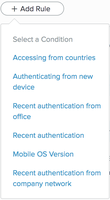
Result:
The Recent Authentication From Company Network rule wizard opens.
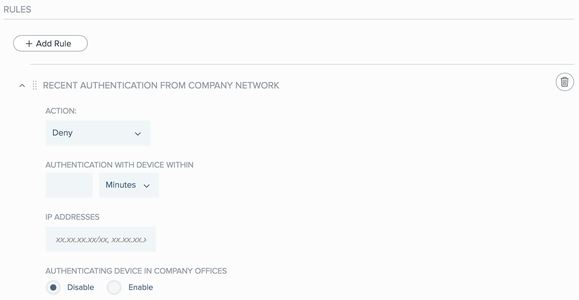
-
From the Action list, select the action that you want to apply when authenticating, if the rule conditions are met.
Choose from:
-
Deny (default): Deny access for authentication requests originating from the selected countries.
-
Approve: Approve access without requiring PingID authentication.
-
Authenticate: Allow the user to authenticate using any of the authentication methods allowed at the policy level.
-
Allowed Methods: Click Allowed Methods to reveal a list of authentication methods allowed by this policy, and then select the check box of each authentication method that you want to allow for this rule. See Rule authentication actions for description per authentication type.
-
-
To define the time period that applies to the Action setting, from the Authentication With Device Within list, select the unit of time in Minutes, Hours, Days, or Weeks, and then enter the numerical value in the text box.

-
In the IP Addresses field, enter a list of external IP addresses or the IP range that belongs to the company network.
Enter the IP addresses and ranges using CIDR notation with each entry on its own line.
-
To require a user’s authenticating device to be in the company offices when signing on from within the company network, in the Authenticating Device In Company Offices section, click Enable.
If you are defining a company office, in addition to an IP address, a mobile authentication method of Swipe, Mobile App Biometrics, or One-time passcode must be defined as an Allowed Authentication Method to apply this rule.
Result:
The Office Locations wizard opens, displaying a list of the office locations currently defined. If the authenticating device is located within one of the defined areas, it is considered to be inside a company office. Define one or more company office locations.
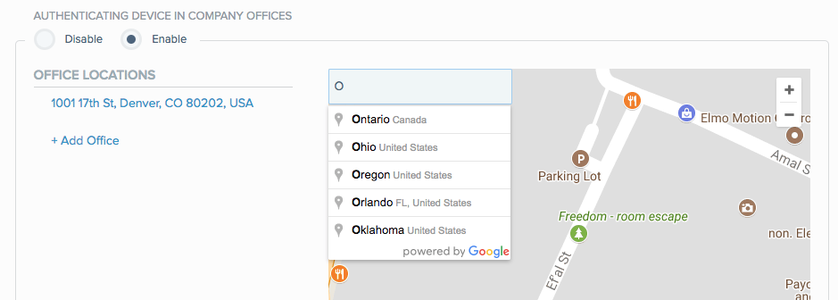
-
To define one or more office locations:
-
Click Add office or enter an address in the search box.
A blue circle appears on the map, defining the office area.
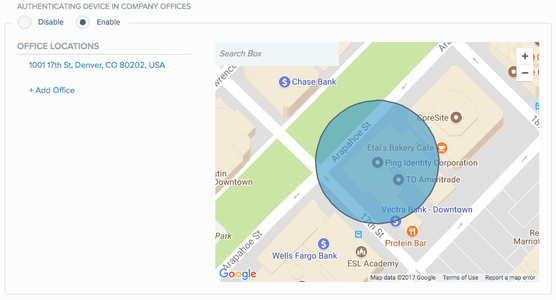
-
Use the white dots on the circle to fine-tune the geofence:
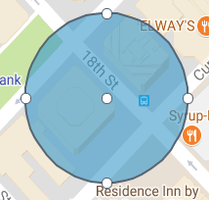
-
To reposition the circle, click and drag the white dot at the blue circle’s center to the desired location.
-
To resize the circle, click and drag any white dot on the circle’s rim.
-
To add another office location, click a location outside the blue circle and a new circle is added.
-
To edit an office location, click the Pencil icon (
 ) and edit the name.
) and edit the name.By default, the location is named after its street address.

-
To delete an office address, click the Minus icon (
 ).
).If you edit or delete offices in the Office Locations list, changes are applied to all rules that specify office locations.
-
-
-
To save the rule and apply it to the relevant policy, click Save.
-
In the Policy list, click and drag the new policy and place it in the order in which you want it to be considered. Click Save Order.
Next steps
To ensure the policy is applied to your organization, go to PingID → Configuration and ensure Enforce Policy is set to Enabled.